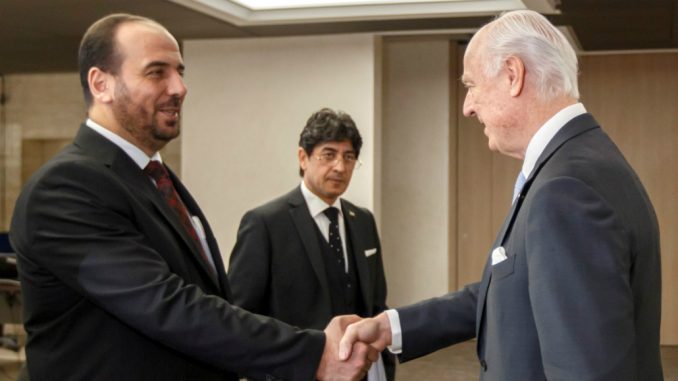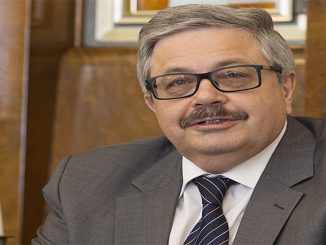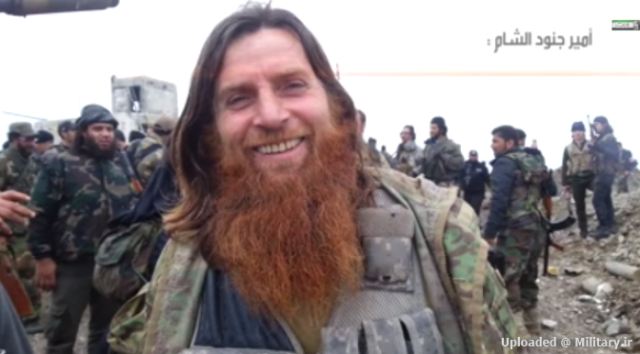
The fourth round of the UN-led Syria peace talks in Geneva ended with the opposition saying there were no clear results but this round was more positive, while analysts said that Russia is seeking to hinder a solution by undermining the opposition’s efforts.
The new round of Syria peace talks has started in Geneva on February 23. after it was previously planned to be on February 8. but delayed in order to take advantage of the results of Astana settlement about the ceasefire in Syria, which was planned by Russia, Turkey, and Iran.
The UN special envoy for Syria, Staffan de Mistura, addressed the both delegations asking them to work together to help in ending the crisis in the country.
De Mistura told the representatives of both delegations that they had a joint responsibility to end a conflict that had killed hundreds of thousands and displaced millions.
The discussions were almost stalled as both parts insisted on their own goals before the talks and accused each other of trying to hinder talks.
The opposition’s delegation accused the regime delegation of seeking to hinder the peace talks as its head said the main goal of the talks should be combating terrorism without mentioning the political process, while regime forces in Syria kept breaching the ongoing shaky truce and killed dozens of civilians since the talks started.
However, both sides could point to small victories. The opposition said that the question of political transition was seriously addressed for the first time, while U.N. envoy Staffan de Mistura said counter-terrorism – an issue pushed by Assad regime’s delegation – had been added to the agenda.
“We have a clear agenda in front of us,” de Mistura told reporters. “The train is ready, it is in the station … it is warming up its engine … it just needs an accelerator and the accelerator is in the hands of those in this round.”
“The agenda is reflected by the baskets,” said de Mistura. “Four baskets – three plus one.”
Three of the baskets lay the foundations for a political transition accountable governance, a new constitution and UN-supervised elections within 18 months, while the fourth is anti-terrorism.
Read more: Has Geneva talks ended with clear agenda as de Mistura said?
No clear results, but positive talks
“Although we are closing this round without clear results … I can say this time was more positive,” chief opposition negotiator Nasr al-Hariri said.
“It was the first time we discussed in acceptable depth the future of Syria and the future of political transition in Syria.
“We discussed with de Mistura important issues in Resolution 2254 and we reached acceptable agreement to start a preliminary framework. We will continue our communication with de Mistura between the rounds,” Hariri said when asked whether the format of the talks has been defined.
The main goal of the Syrian opposition in the talks was to achieve political solution and create an interim government, as “the political transition will open the doors for stable Syria and it is key to solve terrorism in Syria.”
Nasr Hariri said that the HNC has certain remarks on the ideas of UN Special Envoy for Syria Staffan de Mistura on the future of the country laid down in a non-paper that he gave to the delegations for consideration.
“De Mistura gave us a non-paper, they are general provisions on the future of Syria… We have some additional remarks, which we will present to de Mistura, just to enrich this paper,” Hariri told reporters after meeting with de Mistura.
Earlier in the day, de Mistura explained his vision of the future of Syria in a non-paper of 12 points, which he handed over to the delegations.
Moreover, Hariri stated that the HNC sees the United Nations as the key platform for the Syrian reconciliation process despite the organization’s “shortcomings.”
“Despite the international silence on the shortcomings of the United Nations, it is the only platform that we come to, and international resolutions are the only terms of reference for us,” Hariri said.
Russia seeks to undermine opposition’s efforts
Representatives of the main Syrian opposition delegation met with Russian Deputy Foreign Minister Gennady Gatilov on Wednesday to discuss what it says are Moscow’s broken ceasefire promises and put pressure on the regime delegation.
Despite those contacts, Russia accused the main opposition of trying to sabotage the talks by refusing to unite with two smaller dissident groups which have no military muscle but have Moscow’s blessing as opposition voices.
“We called for it and said that the HNC is an important element in the negotiations process, but not the only one, since there are other platforms, namely Moscow and Cairo platforms, which are represented in Geneva, and even offered to meet with the colleagues to discuss the possibility of creation of a common opposition platform. But I felt that there was no such intention and confidence that it could be achieved as yet,” Gatilov told reporters.
The Russian side also doubted the opposition’s ability to negotiate and reach a final deal.
“Unfortunately, we note that based on the results of the first few days the talks are once again raising questions about the ability of representatives of the Syrian opposition to do a deal,” Foreign Ministry spokeswoman Maria Zakharova told a news briefing in Moscow.
“The so-called High Negotiations Committee is refusing to cooperate equally with the Moscow and Cairo platforms and is in fact sabotaging fully-fledged dialogue,” she said, referring to two smaller opposition groups that curry favor in Moscow.
Creating a unified opposition delegation is seen as the key to holding face-to-face talks, but de Mistura said he was not yet ready to do so.
Western diplomats said Russia’s push to unify the opposition was an underhand tactic.
“Some within the opposition said they were extremely disappointed with their meeting with the Russians, who stuck to their stance that the opposition was not united.
“Russia is trying to do that to destabilize the talks. They insist on the opposition becoming one. This is a tactic to weaken the process. I hope that Staffan can push back on it.”
The Syrian crisis began as a peaceful demonstration against the injustice in Syria. Assad regime used to fire power and violence against the civilians and led to armed resistance. 450.000 Syrians lost their lives in the past five years according to UN estimates, and more than 12 million have lost their homes.



